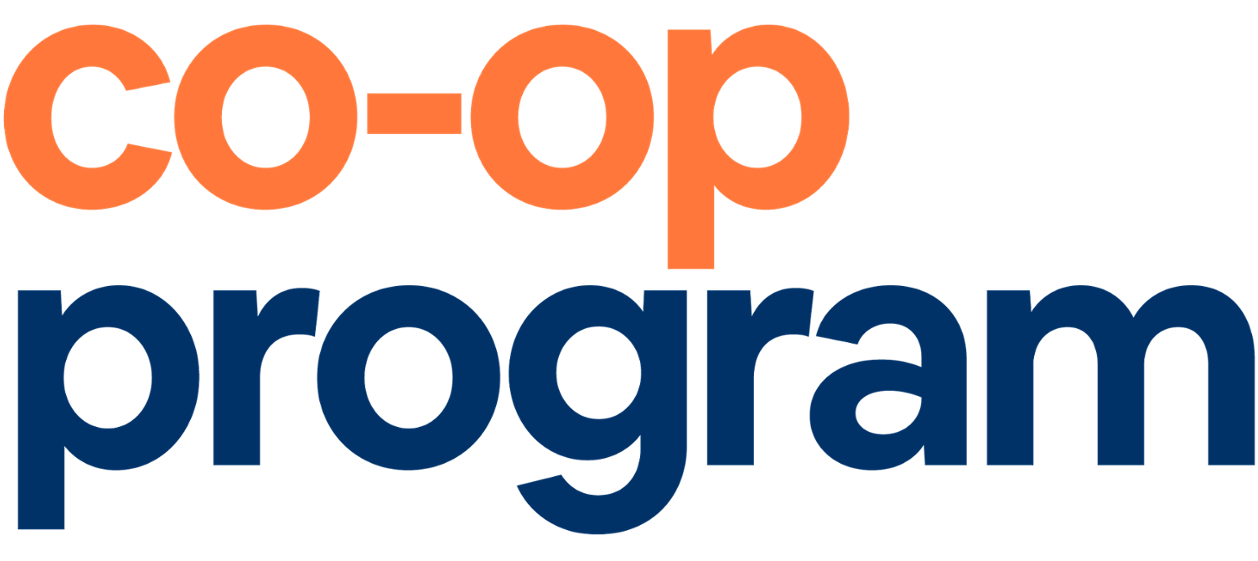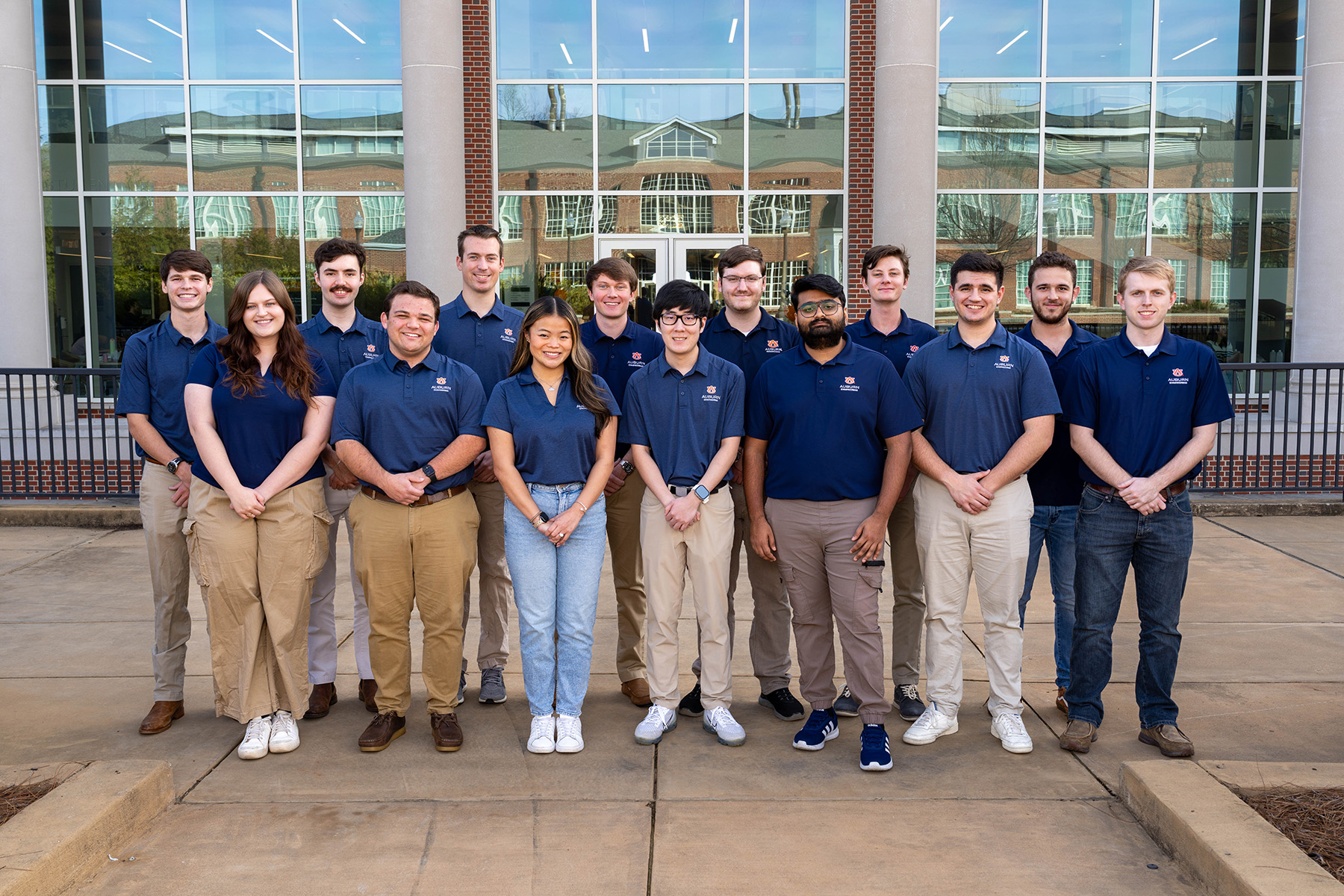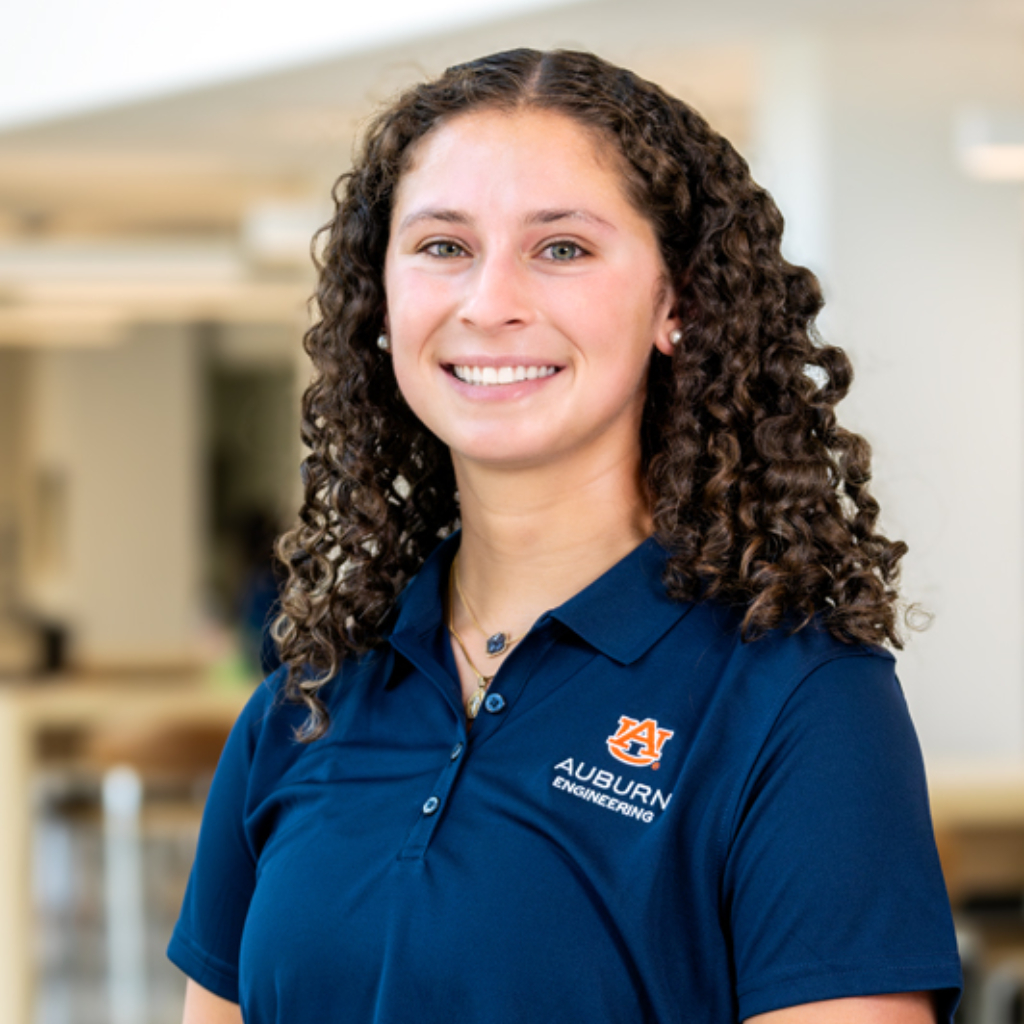
COOPERATIVE EDUCATION (CO-OP) is a planned and supervised program that alternates semesters of full-time college classroom instruction with 3 semesters of full-time paid employment. The work assignments are closely related to your academic program and are designed to prepare you for your professional career by combining your academic training with practical work experience.
Interested in co-op?
Have you secured a co-op for a future semester?
*A formal, approved offer letter is required to report a co-op work experience.
Quick Facts
- All co-op positions are paid! The average co-op salary is $20.86/hour based on the 2022-2023 academic year
- You can gain up to 1 year (52 weeks) of experience before graduating
- Over 480 students are currently in the program
- 84% of students are in the Samuel Ginn College of Engineering
- In recent years, starting salaries for Auburn Engineering students with co-op or internship experience were 8% higher than students with no professional experience
- The Auburn Co-op Program was established in 1937
What's the Difference Between Co-op and Internship?
- Three-semester commitment with the same company and is always a paid experience.
- Co-op takes place year-round and students gain up to 1 year of experience and is a full-time work experience.
- Co-op students have the opportunity to develop an in-depth skillset and manage their own projects during their work terms.
- Companies give more responsibility to co-op students due to the longer period of time spent at the company.
- Engineering students are ready to apply for co-op positions during their sophomore year.
- Co-op students receive priority registration status and are able to register each semester during the early registration period for priority students.
- Students do not pay tuition during co-op work semesters and are enrolled in a 0-credit hour course to maintain student status.
- One semester commitment.
- Internships typically take place only during the summer semester or 10-12 weeks but can happen during fall and spring semesters as well.
- Internships may be part-time or full-time.
- Internships provide a broader overview of work life.
- Internships allow students to spend time at different companies.
- Students can intern as early as the summer after their Freshman year
- Students do not pay tuition during internships and are enrolled in a zero credit hour course to maintain student status.
Visualize your potential co-op work rotations!
The Co-op Program will work with students in any major or academic program to identify a suitable co-op opportunity, but co-op positions are typically only available for students in Engineering, Building Science, Supply Chain Management, Business, and related disciplines.
ELIGIBILITY REQUIREMENTS:
- Students must have a cumulative GPA of at least 2.5 to join the program.
- Engineering Students must be in-major before beginning the first co-op work term.
If you don't meet the requirements for co-op, internships are another great way to gain industry experience.
Complete the Professional Experience Interest Form
You will have the option to indicate interest in four areas: co-op, internship, undergraduate research, and global experiences. CDCR offers a Canvas course to support your search for co-op and internship search called Co-op + InternReady.
INTERESTED? STEPS TO GET STARTED:
- Attend an Interest Meeting: These usually take place during the first few weeks of each semester. See Upcoming Co-op + Internship Events
- Complete the Professional Experience Interest Form.
- Receive academic advisor approval on the Co-op Alternation Plan.
- Meet with an Engineering Career Coach: Schedule an Appointment on Handshake
- Upload your revised resume to Handshake.
- Schedule on-campus interviews and attend Career Fairs.
JOB SEARCH + INTERVIEWING
Handshake: All co-op positions are posted on the University's online job search platform, Handshake. Be sure to upload your updated resume to Handshake and mark it public prior to applying for jobs.
Career Fairs and on-campus interviews are your opportunity to interview with 100+ companies to find an exciting and enriching opportunity. Pre-schedule on-campus interviews on Handshake!
Check out these helpful interview tips and tricks to help you land a job.
Send-Off Meeting: All students who have accepted co-op positions are required to attend a Co-op + Internship Send-Off Meeting at the end of the semester in which the student accepts a position. At this meeting, students will receive helpful guidance for having a successful work experience.
FINANCIAL INFORMATION
Scholarships: The Office of University Scholarships works with students to defer appropriate scholarships when students are completing co-op work terms. Please review this FAQ page for more information on this process.
*If you currently receive Samuel Ginn College of Engineering scholarships, please contact Jessica Taylor, Director of Engineering Recruiting and Scholarships, at dewbeja@auburn.edu.
Meal Plans: Students can request an exemption from meal plans for each work semester in AU Access > My Campus > Accommodations > Away From Campus Dining Accommodation Request.
Contact Dining Services for specific questions: dining@auburn.edu or 334.844.8504.
On-Campus Housing: Co-op students who need to request termination of their Auburn on-campus housing contract due to a co-op work semester may use this link.
Auburn Athletics: If you are working in the fall semester and purchase AU Football tickets, a $110 fee will be applied to your student account to cover a student fee associated with Auburn Athletics.
What is a Co-op Work Plan?
This tailor-made academic blueprint, created by a career coach in the CDCR, integrates your future co-op rotations into your upcoming school semesters. This plan ensures you never miss a vital class by carefully scheduling school semesters around your co-op work semesters. You can think of it as a bridge between your academic pursuits and real-world work, guaranteeing you a smooth transition and maximizing your learning potential. Your academic advisor reviews and approves this flexible plan, which can change as your academic journey unfolds.
What do I do with my Co-op Work Plan?
Once you complete the Professional Experience Interest Form, you will receive the Co-op Eligiblility Form link if you meet all program requirements. Then, following the completion of the Co-op Eligibility Form, you will receive your personalized Co-op Work Plan. Your academic advisor will be included in the email and their signature on the plan is required before proceeding further. To facilitate co-op opportunities, please connect with your academic advisor to receive their approval and be sure to upload the signed plan to Handshake.
Is co-op only for engineering majors?
No, the Co-op Program is for all majors across campus. We are housed in the College of Engineering because 84% of our co-op students are in engineering. However, all students can apply and seek positions. If you are a non-engineering student and are interested in co-op, please schedule an appointment on Handshake or complete the Professional Experience Interest Form.
Does co-op always delay graduation?
Not necessarily! While co-op can shift your graduation date, the impact depends on your unique academic situation. Factors like your school year, current course credits, and even your major play a role. However, co-op packs nearly a year of industry-relevant experience into your backpack, by maximizing summer semesters. Additionally, you score nearly a year of industry-relevant experience before graduation. The timing might adjust a bit, but the benefits such as enhanced employability and a competitive edge in the engineering job market can outweigh the shift.
Where will I live if I go to work outside of Auburn or my hometown?
Though you are responsible for finding your own housing in a new city, there are many resources that can help you in your housing search.
Social Media:
Facebook Groups: Dive into local groups with keywords like "sublet," "roommate finder," and the city/state you're heading to. Many students and young professionals utilize these groups, offering a treasure trove of short-term options. Remember, caution is key when subletting – always research and verify before committing.
College Connections: Research colleges or universities in and around your co-op’s city. Joining their Facebook, Discord/Reddit, or other social media groups can connect you with students in similar situations looking for roommates or sublets. Shared age ranges and experiences can make for a smooth transition.
Reach Out and Explore:
HR/Recruiter Connection: Don't be shy! Reach out to your HR contact or recruiter. They might have inside information about other co-ops/interns also searching for housing. Sharing your situation and asking about their experiences can lead to valuable leads. Just remember, confidentiality might be a factor.
Networking: Tap into your personal network! Let friends and family know you'll be living in the new city. They might have connections or know individuals looking for roommates.
Exploring Options and Resources:
Airbnb: If your co-op offers a housing stipend, consider Airbnb in certain cities. Depending on your timeframe, it might even be cheaper than committing to a lease.
Professional Help: Real estate agents can help! Share your budget, desired number of rooms, and move-in timeframe, and they'll provide a curated list of options. Be prepared for a potential fee for their services.
Extended Stay Hotels: Explore extended stay hotels, which often offer kitchenette facilities and flexible rates for longer stays.
Student Housing Hubs: Check websites like dorms.com or co-living websites like CampusPads for student-specific short-term housing options.
Online Resources: Websites like ApartmentFinder (https://www.apartmentfinder.com/) and Apartments.com (https://www.apartments.com/) offer a vast selection of listings. Plus, Auburn University itself has a helpful resource for off-campus housing: https://offcampushousing.auburn.edu/.
Remember:
Start early: The sooner you begin your search, the more options you'll have.
Be flexible: Your ideal situation might not be readily available, so keep an open mind and consider different options.
Safety first: Always prioritize your safety when researching and meeting potential roommates or landlords. Trust your gut and don't hesitate to walk away if something feels off.
Sample Co-op Alternation Plan Schedule
|
Semester |
Plan A |
Plan B |
|
Fall Sophomore Year |
School |
School |
|
Spring Sophomore Year |
Work Semester 1 |
School |
|
Summer Sophomore Year |
School |
Work Semester 1 |
|
Fall Junior Year |
Work Semester 2 |
School |
|
Spring Junior Year |
School |
Work Semester 2 |
|
Summer Junior Year |
Work Semester 3 |
School |
|
Fall Senior Year |
School |
Work Semester 3 |
|
Spring Senior Year |
School |
School
|
|
Summer Senior Year |
Graduated |
School |
*Graduation time varies. It depends on which classes are offered in the summer semesters and when senior design sequences are offered.
Can I take classes while on co-op?
Yes, you may take up to 5 credit hours of classes while on your co-op rotation(s). We do not recommend students in their first semester to take classes as the adjustment from full-time student to full-time employment is often challenging.
STUDENT POLICIES + INFORMATION
Academic Policy
Co-op Program students must maintain a 2.5 cumulative GPA to be in academic good standing and continue on in the Co-op Program.
Good Standing = GPA semester and cumulative >/= 2.50.
Co-op Warning = GPA semester or cumulative drops below 2.50.
Co-op Probation = GPA semester and cumulative drop below 2.50
- Continue Work = Employer must approve work while on probation.
- Continued Probation = GPA semester and cumulative remain below 2.50 for 2nd time,
and employer approves continued employment.
Co-op Suspension = GPA Semester and cumulative drop below 2.00 or below 2.50 for third term. Student may not enroll in Co-op 4910, 4920 or 4930. Employer will be informed.
Additional Information
Salary: Co-op positions are paid an average salary of $20.86/hour. Click here for more salary information.
Housing: Co-op students are responsible for their own housing costs; however, some companies may offer housing stipends or provide housing for students.
Meal Plans: Students can request an exemption from meal plans for each work semester through AU Access. AU Access > My Campus > Away from Campus Dining Accommodation Request.
Required Class: During work rotations, students must register for COOP 4910, 4920, or 4930. Students in work rotations do not pay tuition or student service fees. There is a one-time, $100 co-op fee charged during the second work term. The COOP classes are S/U, and a satisfactory grade is earned by completing 2 surveys and 1 evaluation.
Scholarship Eligibility: During work terms, scholarships are placed on hold. Please contact The University Scholarships Office to double-check eligibility requirements. For more information, please review these scholarship FAQs.
*If you currently receive Samuel Ginn College of Engineering scholarships, please contact Jessica Taylor, Director of Engineering Recruiting and Scholarships, at dewbeja@auburn.edu.
Football Tickets: All students are still eligible to purchase football tickets.
Making Changes: Connect with an Engineering Career Coach to request any change to your plans for upcoming school and work semesters.
SURVEYS + EVALUATIONS
At various points throughout your work rotation, you will receive surveys and a link to an evaluation.
Beginning
At the beginning of your work term, you will receive a Work Information Survey to help the Co-op Program capture the most up-to-date information about your co-op job. This brief survey asks for information such as city, state, and salary.
Middle
Around mid-term, you will receive a Check-In Survey. This survey is to check in on your work experience and for you to privately report any potential work issues to a Career Coach. Remember, you do not have to wait until this survey is sent to report an issue.
End
Towards the end of each work term, you and at least one supervisor are required to complete performance evaluations on SkillSurvey. Each semester, you will receive an email with a unique link to the survey.
SkillSurvey assessment is a valuable tool that allows students to obtain feedback from multiple managers and co-workers regarding soft skill development. It was developed based on the 8 NACE Career Ready Competencies, which recruiters of college students have determined as the 8 most desired soft skills in new college graduates. Refer to this page to learn more about the Career Ready Competencies.
CO-OP STUDENT BENEFITS
- Priority registration status
- Co-op Diploma ($15 fee) upon graduation
- Honor cord + padfolio awarded
- 1 year of relevant industry experience
Steps to Obtain Work Authorization
- Conduct a co-op search | Stay in communication with your International Student Advisor, Academic Advisor, and an Engineering Career Coach to help you prepare for and engage in the search.
- Obtain a written co-op offer letter from a company or organization.
- Report your Co-op to the Engineering CDCR
- Obtain Curricular Practical Training (CPT) application form at the Office of International Students and Scholars Services.
- Obtain signature approval from your department
- Register for COOP 4910 (first work term) (0-credit) during the semester you will engage in the co-op experience
- Complete and submit your CPT application
- Confirm CPT work authorization approval - reviewed by the Office of International Students and Scholars Services.
When should I accept the co-op offer?
The Office of International Students and Scholars Services cannot process your CPT application until after your enrollment in COOP 4910. If ever in doubt about the timing of your co-op offer acceptance, meet with an Engineering Career Coach to strategize your plan. In all circumstances, make sure you do not complete any hire paperwork or company orientation until after your CPT application is processed and approved.
Do I need to be enrolled in classes during my co-op?
For each work term, you will enroll in the corresponding Co-op Course:
- COOP 4910 | First work term
- COOP 4920 | Second work term
- COOP 4930 | Third work term
Spring 2025 (20 weeks)
Report to Work Monday, January 6
Survey 1 Due Friday, January 31
Survey 2 Due Friday, March 21
SkillSurvey Due Thursday, May 1
Work Term Ends Friday, May 23
Summer 2025 (12 weeks)
Report to Work Monday, May 5
Survey 1 Due Friday, May 30
Survey 2 Due Friday, June 20
SkillSurvey Due Friday, July 25
Work Term Ends Friday, August 1
Fall 2025 (20 weeks)
Report to Work Monday, August 4
Survey 1 Due Friday, August 29
Survey 2 Due Wednesday, October 17
SkillSurvey Due Wednesday, December 1
Work Term Ends Friday, December 19
Spring 2026 (20 weeks)
Report to Work Monday, January 5
Survey 1 Due Friday, January 30
Survey 2 Due Friday, March 20
SkillSurvey Due Friday, May 1
Work Term Ends Friday, May 22
Students participate in a 3-semester rotation (typically a Fall, Spring, and Summer semester) to get a full year of experience (52 weeks) prior to graduation.

Co-op + Internship Ambassadors are a group of student leaders devoted to outreach and programming to increase awareness of the Co-op + Internship Program and encourage undergraduate participation. Co-op + Internship Ambassadors are upperclassmen who have successfully completed at least one co-op or two internship work terms, demonstrate leadership on campus and at their respective workplaces, and want to positively impact the campus community at large. Eligible students will be invited to apply for this volunteer role in March of each year.
Interested in connecting with an ambassador to ask about their experience?
Complete the Ambassador Connections survey or email any student below.
Below are the Fall 2024 Co-op + Internship Ambassadors.
STUDENT CO-OP STORIES
- Abigail Ford | Chemical Engineering | Johnson & Johnson Innovative Medicine
- Bryce Little | Mechanical Engineering | Club Car
- Cole Cordle | Software Engineering | Campus Web Solutions
- Ishan Patel | Chemical Engineering | Evonik
- Jackson Curtis | Civil & Environmental Engineering | National Center for Asphalt Technology
- Jagger Lynn | Computer Engineering | Neptune Technology Group
- Jesus Ruelas Barragan | Electrical Engineering | Georgia Power
- Lauren Powell | Chemical Engineering | International Paper
- Leighanna Howell | Mechanical Engineering | Neptune Technology Group
- Nathan Plourde | Electrical Engineering | Neptune Technology Group
- Peyton Carr | Industrial & Systems Engineering | Johnson & Johnson
- Ryan Fuerst | Mechanical Engineering | Mercedes-Benz U.S. International
- Seth Walker | Chemical Engineering | ExxonMobil
- Sricharan Ramalakshm | Mechanical Engineering | Nissan North America
- Tucker Strane | Aerospace Engineering | IS4S and Fokker Services Group























